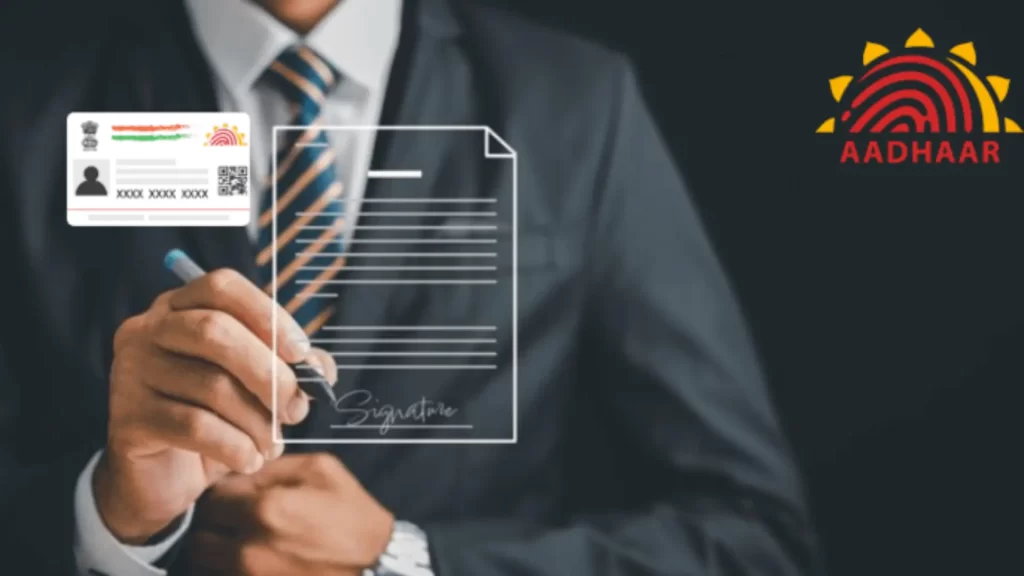Electronic signatures, or eSignatures, have revolutionized document signing in the fast-paced digital society we live in today. They offer a practical and effective substitute for the conventional practice of signing documents using ink on paper. Aadhaar eSign solutions are now a prominent choice for digitally signing documents in India among the several eSign options available. But a crucial query emerges: Is the Aadhaar eSign legitimate and lawful in India? This extensive tutorial examines the legal environment around Aadhaar eSign, its features, and the extent to which Aadhaar-based eSignature platforms are enforceable under Indian law.
What is Aadhaar eSign?

With the help of their Aadhaar number and an OTP (one-time password) for authentication, Aadhaar holders can digitally sign documents using the Aadhaar eSign electronic signature service. Using the distinctive Aadhaar identity system, this eSign solution ensures a safe and effective procedure for digitally signing documents in India. Digitally signed documents have legal credibility since the eSignatures created by online Aadhaar eSign in India are accepted as legitimate signatures. In addition to improving security, this technology expedites the signature procedure, simplifying document authentication for individuals and companies. Users can ensure that their electronic signatures are widely acknowledged and legally enforceable by utilizing Aadhaar eSign. This facilitates a smooth transition to digital workflows in multiple sectors throughout India.
Is Aadhaar eSign legally valid?
Aadhaar eSign in India is legitimate legally. The Information Technology Act 2000 provides a legal basis for using eSignatures, including Aadhaar-based eSignatures. According to Section 5 of the IT Act, a digital signature satisfies legal requirements for documents requiring signatures or bearing the signature of any individual. This encompasses Aadhaar eSign solutions as long as they are completed in compliance with the guidelines.
What kind of documents can be eSigned via Aadhaar-based eSignatures?
A wide range of documents can be eSigned using Aadhaar eSign. These include:
- Legal contracts and agreements
- Non-disclosure agreements (NDAs)
- Insurance forms
- Government forms and applications
- Corporate documents, such as board resolutions
- Employment contracts
- Vendor and supplier agreements
However, certain documents, such as wills, negotiable instruments, and some types of property transfers, may still require traditional signatures due to specific legal requirements.
How does Aadhaar eSign work?
Aadhaar eSign in India operates through a secure process involving the following steps:
- User Authentication: The user initiates the eSign process by entering their Aadhaar number at authorised certifying authority’s gateway.
- OTP Verification: An OTP is sent to the user’s registered mobile number or email linked to their Aadhaar.
- Document Signing: Upon entering the OTP, the document is digitally signed using the Aadhaar holder’s private key, which an authorised certifying authority manages.
- Signature Verification: The digital signature is embedded in the document and can be verified using the public key provided by the certifying authority.
This process ensures the authenticity and integrity of the digitally signed documents.
How can I enforce an Aadhaar eSigned document in court?
Aadhaar eSigned documents are legally enforceable in court, provided they meet the requirements of the IT Act and the Evidence Act. To enforce such a document:
- Ensure Compliance: Ensure that the eSign process complies with the IT Act and that eSignatures in India are created using a licensed eSign Service Provider.
- Document Integrity: Ensure the document has not been tampered with after being eSigned.
- Certificate Validation: Verify the digital signature certificate associated with the eSigned document to confirm its authenticity.
- Legal Representation: Present the eSigned document as evidence in court and the necessary digital signature verification.
What does the Evidence Act say about Aadhaar eSign?
Electronic documents and signatures are accepted as admissible evidence under the Indian Evidence Act of 1872. Section 65 B of the Evidence Act provides the basis for the admission of electronic records, including those signed using Aadhaar eSign. The eSigned document may be presented as evidence in court if it satisfies the requirements outlined in the Evidence Act.
FAQs
Aadhaar eSign is lawful, and the Information Technology Act of 2000 allows electronic signatures in India. This statute provides the legal foundation required for using digital signatures, including Aadhaar-based ones.
The Indian Evidence Act of 1872 recognizes Aadhaar eSigns as legitimate electronic records, so they are admissible in court. As long as the properly eSigned documents meet all applicable legal criteria, they can be used as evidence.
Aadhaar eSign can be used to sign an extensive range of documents, including job contracts, government forms, insurance applications, legal contracts, and business documents. However, some papers might still need traditional signatures because of particular legal requirements.
Summing up
In India, Aadhaar eSign offers a quick and safe digital signature solution for papers. It is admissible in court under the Indian Evidence Act of 1872 and legally recognized under the Information Technology Act of 2000. Aadhaar-based eSignature platforms are legitimate and enforceable, making it possible to eSign various documents, including contracts and official forms. Because of its adaptability, Aadhaar eSign is helpful in the current digital era. Through comprehension of the legal structure and features of Aadhaar eSign, people and organizations can utilize this technology with assurance to expedite their document signing procedures, guaranteeing security and effectiveness in their activities. Aadhaar eSign makes it easier to collect legally binding signatures for personal and professional transactions, making it a crucial part of contemporary digital workflows.



